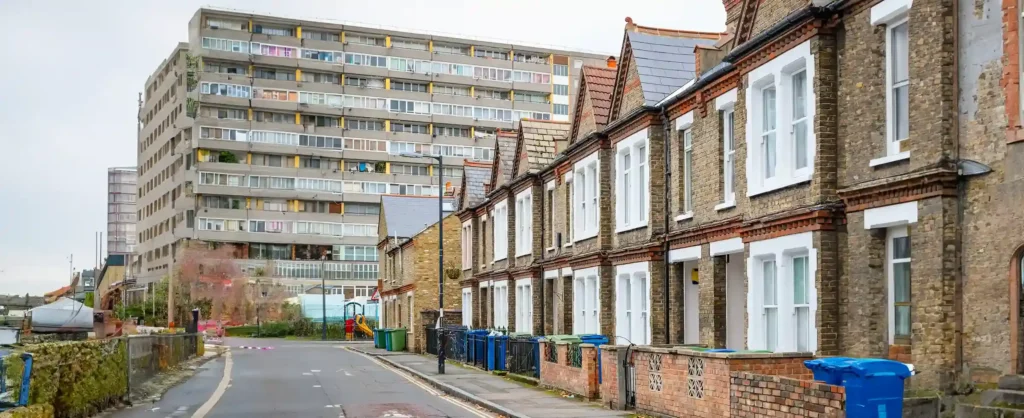The UK has always had a complicated relationship with modular housing. In many ways, modern modular homes are still being viewed through the smudged lens of the hastily built post-WW2 prefabricated homes rolled out as a quick fix for the housing shortage that gripped the nation at the time.
Almost 100 years later, public consensus on modular homes may not have significantly changed, but the quality of modular homes themselves certainly has. And if there’s one thing that links the UK’s present to its war-torn past it’s a common problem affecting the lives of its people: a nationwide housing crisis.
I’m a 22-year-old professional working in the London area and the reality of my situation is that homeownership is a long, long way off at best and an impossibility at worst. Even with house prices falling to record levels recently, the twin forces of the cost of living crisis and interest rate spikes mean a constant uphill battle to secure a place that achieves that all-important homebuyer’s trifecta of affordability, availability and accessibility. And, in the private rented sector, renters are forced to spend four times as much of their income on housing as homeowners, leaving a third of working tenants susceptible to arrears and eviction if they were to lose their jobs today.
So, where does this leave us as a culture of would-be homeowners and worried renters?
As far as I’m concerned, we can either cling to outdated notions of “real homes” and “fake homes” or we can embrace the future by adopting a new approach. Modular homes are a potential game changer for the housing market and all it will take to accelerate that change is investing more time and money into developing the industry.
You can find out what’s been happening to interest and mortgage rates this year in our mortgage rate blog. For more on the importance of modular homes to the future of housing, read on.
Why are Modular Homes Essential for Affordable Housing?
The stats for housing simply aren’t looking good. In addition to inflated interest rates and falling house prices, housing demand and affordability are keeping homeowners and renters from succeeding in the market.
In London alone, average rental costs are projected to increase to £2,700 per month in 2024 and early projections by experts suggest that the living standards of the average UK worker will cause them to be worse off financially than they are this year. The possibility of a full-scale recession caused in part by house pricing doesn’t seem hard to imagine and the Bank of England has made policymakers aware of this by placing the country on recession alert.
Whether you’re an investor, a landlord, a renter or a homeowner, this paints a grim picture of the UK’s economic landscape, and the housing market stands at the edge of a cliff that seems to lead to pinched pennies and missed payments for everyone.
Affordable housing and rental schemes remain as much of a priority as it has always been for policymakers but with many falling short due to either a lack of accessibility for those who benefit from them or a continued inability to meet new build targets. Though Sadiq Khan recently claimed that London met its affordable housing target this year, research by Savills found that the capital alone would need a budget of £4.9bn a year between 2023-24 and 2027-28 to deliver the full 130,000 affordable homes a year needed to keep up with population growth. Further data from Homes England’s annual report also showed that 72% of the shortfall in house building delivery could be attributed to affordable housing programmes, suggesting the market as a whole may continue to underdeliver going forward.
One of last month’s blogs explored the potential of alternative housing as a potentially lucrative solution to a number of the problems facing the housing market right now, and its observations still hold true. US homes are 40% cheaper than their UK counterparts due to the use of modular construction methods at the production level, and, according to McKinsey, those methods have the potential to speed up the process of housebuilding by as much as 50% with a 20% cut in costs. But unlocking that potential for massive boosts to affordable housing development requires investment, focus and a willingness to embrace these homes as an evolution, not an offshoot.
Besides that, it will also require stakeholders and policymakers to put more precedence on ensuring these affordable housing and rental schemes stay affordable. In London, landlords participating in affordable rental schemes were caught demanding that applicants earn anywhere between £35,000 and £60,000 to be considered. Across the country, only 5% of private rental properties were affordable on housing benefits in June this year following a stall on a cost of living adjustments that has been in place since April 2020. This is more than just a supply and demand problem: it’s a systemic lack of commitment to affordable housing solutions that has led to a lack of consensus at all levels of the housing market.
The bottom line is that real progress that pulls the housing market out of its dire straits will require transformative changes that go beyond following a property development plan that’s been tried, tested and found lacking. In my mind, that change begins with modular housing and private-sector involvement.
How Can Concept Capital Group Help?
As the UK market leader in modular housing investments, Concept Capital Group can prioritise speed and affordability in building high-quality homes for vulnerable renters. We don’t just build modular homes using a manufacturing method that’s both eco-friendly and high quality, we also fully manage our homes from factory to tenancy, allowing investors to enjoy all the benefits of being a landlord and supporting the spread of affordable housing without a commitment of time they don’t have.
When it comes to socially impactful investments, profit isn’t everything, but you can rest assured that the team at Concept Capital Group will assure you receive your rental income rain or shine thanks to our system of pre-approved tenancies. That means no void periods and no unnecessary stress for you or your tenants.
Investors like you can make all the difference in bringing the housing market into the 21st century. To find out more about our buy-to-let investment opportunity and the part modular housing plays in it, you can book a call with our team today.













